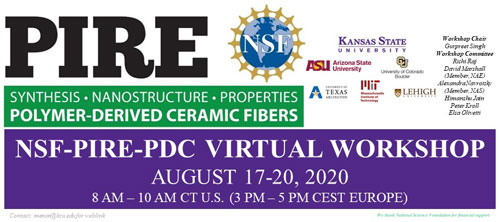August 25, 2020
Virtual international workshop provides insight on next-generation ceramic composites for aero, defense industry

The third annual NSF-PIRE-PDC workshop, created by K-State Carl R. Ice College of Engineering faculty member Gurpreet Singh, was hosted Aug. 17–20 in a virtual-only format due to the COVID-19 pandemic.
Workshop seminars included topics related to polymer-derived ceramics and additive manufacturing of high-temperature ceramic matrix composite, or CMC, materials for aerospace applications.
The novel materials produced through the National Science Foundation Partnerships for International Research and Education, or PIRE, project are relevant for a wide variety of defense applications ranging from electronic sensors to engine blades and rocket nozzles. Many workshop registrants were from aero and defense industries, including Boeing, Spirit AeroSystems, HRL Laboratories, Starfire Systems, Raytheon United Technologies and Sierra Turbines. In addition, scientists from the Air Force Research Laboratories and program officers of government funding agencies such as AFOSR and NSF attended the workshop to share their research findings and learn about the applications of CMC materials, respectively.
The workshop hours allowed for maximum interaction from researchers worldwide, as faculty members and students from France, Germany, India, Italy, Japan and Spain virtually presented their research. Representatives from academia and industry had ample opportunities to conduct in-depth discussions, with a specific focus on translating academic research to meet industrial needs.
The workshop also highlighted student research and accomplishments. Graduate students in the PIRE project showed most of the presentations on the first day of the workshop, while the last day was dedicated to undergraduate student presentations. A total of eight undergraduate students — including two female students co-sponsored by the Women in Engineering program from the K-State mechanical and nuclear engineering department, Maren Ellis and Porter Herold — were part of the PIRE summer project.
Most undergraduate students gained exposure to their summer research topics through scientific literature reviews, while a few conducted limited research in laboratory settings. Although most undergraduate students did not have extensive hands-on training in laboratory settings, they gained an in-depth theoretical knowledge of their research project. Because some participating undergraduate students plan to return to the PIRE project next summer for research abroad experience, the groundwork for next summer's research has already been laid.
The virtual workshop platform was a major draw to students, scientists and engineers — nearly half the registrants were first-time participants, with twice the overall attendance numbers from previous workshops.
"I expected a bigger turnout than the previous year, but the registration numbers from this year's workshop were astounding," Singh said. "This just goes to show how many are interested in our project, and that the field is growing. We are grateful for the opportunity to establish PDC research in the U.S. and collaborate with academia and industry across the globe."
Singh, the Harold O. and Jane C. Massey Neff associate professor at the College of Engineering and principal investigator, was awarded the NSF PIRE grant for his work on polymer derived ceramics, or PDCs, in 2018. The grant was awarded to Singh for his work on new ceramics made from silicon-based polymers. The $4.7 million grant is currently in its third year, with funding available for five years.
"I am very excited for the future of PDCs and the camaraderie that being part of such a huge collaboration brings," Singh said.
